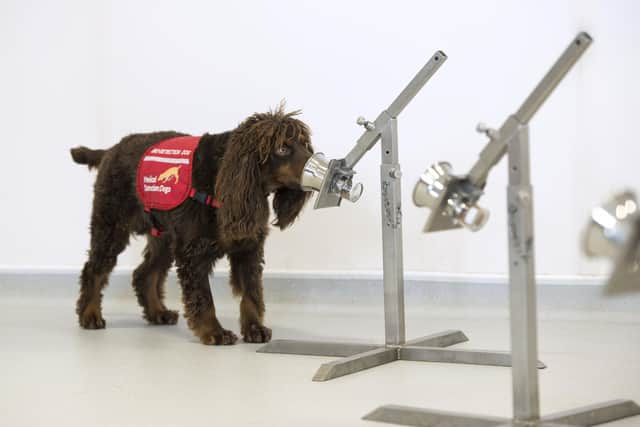'Game changing' project to train Covid dogs to detect symptoms of coronavirus
and live on Freeview channel 276
The trials, involving Durham University, will form part of research into potential non-invasive, early-warning methods of detecting the virus, and are being backed by £500,000 of government funding.
The dogs, which are already used to sniff out diseases such as cancer, malaria and Parkinson's disease, will be given intensive training to spot Covid-19 before symptoms appear.
Advertisement
Hide AdAdvertisement
Hide AdThe first phase of the trials will be conducted by researchers at London School of Hygiene & Tropical Medicine (LSHTM), in collaboration with the charity Medical Detection Dogs (MDD) and Durham University.


It will determine whether the six dogs, a mixture of labradors and cocker spaniels, are able to detect coronavirus in humans from odour samples.
They will be trained using samples from people who are infected with coronavirus and those who are uninfected, as some respiratory diseases are known to change body odour.
Professor Steve Lindsay, from the Department of Biosciences at Durham University, said: “We’re absolutely delighted to be awarded this funding so we can start this important research.
Advertisement
Hide AdAdvertisement
Hide Ad“If we can show that our trained dogs can identify people carrying the virus, but who are not sick, it will be a game changer. We will then be able to scale-up the use of dogs at ports of entry to identify travellers entering the country with the virus. This will be important to prevent a second wave of the epidemic.”


Minister for Innovation Lord Bethell said: "Bio-detection dogs already detect specific cancers and we believe this innovation might provide speedy results as part of our wider testing strategy.
"Accuracy is essential so this trial will tell us whether 'Covid dogs' can reliably detect the virus and stop it spreading."
Research gathered by MDD has shown that the dogs can be trained to detect the odour of disease at the equivalent dilution of one teaspoon of sugar in two Olympic-sized swimming pools of water.
Advertisement
Hide AdAdvertisement
Hide AdThe charity estimates that each animal could screen up to 250 people per hour once trained.
Professor James Logan, head of the department of disease control at the LSHTM, said he was "hopeful" of success.
"Our previous work has shown that malaria has a distinctive odour, and with Medical Detection Dogs, we successfully trained dogs to accurately detect malaria," he said.
"This, combined with the knowledge that respiratory disease can change body odour, makes us hopeful that the dogs can also detect Covid-19.
Advertisement
Hide AdAdvertisement
Hide Ad"If successful, this approach could revolutionise how we detect the virus, with the potential to screen high numbers of people."
Dr Claire Guest, co-founder and chief executive of Medical Detection Dogs, said: "We are delighted that the Government has given us the opportunity to demonstrate that dogs can play a role in the fight against Covid-19.
"They have the potential to help by quickly screening people, which could be vital in the future.
"We are sure our dogs will be able to find the odour of Covid-19 and we will then move into a second phase to test them in live situations, following which we hope to work with other agencies to train more dogs for deployment.
Advertisement
Hide AdAdvertisement
Hide Ad"We are incredibly proud that a dog's nose could once again save many lives."
“We have already demonstrated our expertise in canine disease detection by successfully training dogs to detect diseases like cancer, Parkinson’s and malaria, and we apply that same science to train life-saving Medical Alert Assistance Dogs to detect odour changes in individuals caused by their health condition.
“We are sure our dogs will be able to find the odour of COVID-19 and we will then move into a second phase to test them in live situations, following which we hope to work with other agencies to train more dogs for deployment. We are incredibly proud that a dog’s nose could once again save many lives.”